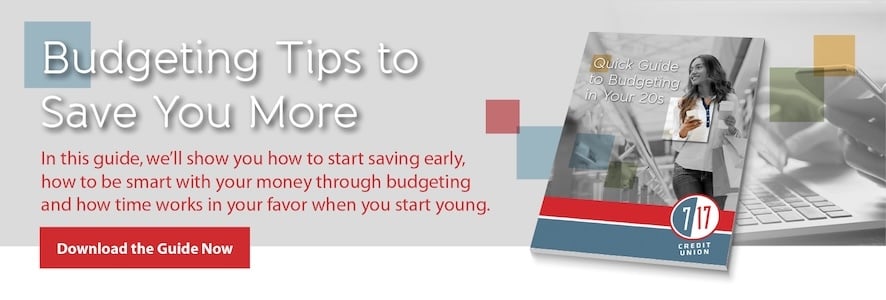- 7 17 Staff
Inflationary Realities: Adapting Your Budget To Economic Pressures

Inflationary pressures on personal budgets have a huge impact on your day-to-day. Suddenly, the same gallon of milk you bought last month is twice as expensive. You’re keeping track of every mile you drive in your car.
And your carefully balanced budget is totally thrown out of whack. Your numbers are no longer adding up, so you need to rethink your spending to reduce the risk of stacking up debt.
Being able to recognize the signs of inflation and adjust your budget to protect your finances is a huge part of financial health. Wondering how to do that? You’re in the right place.
Be Proactive, Not Reactive: How To Recognize the Early Signs of Inflation
As a consumer, it can be difficult not to feel blindsided by prices rising in every aisle.
But let’s rewind a little bit. Before inflation in the United States reached historic highs in 2022, were there signs that eagle-eyed savers could see?
Here's a breakdown to help you spot inflation's impact:
Start by understanding how inflation works. If you know how inflation is caused, you’ll be ready to anticipate and adapt to it. There are two general types of inflation:
- Demand-pull inflation: This occurs when demand for goods and services exceeds supply, causing prices to rise.
- Cost-push inflation: This happens when the cost of production increases, leading to higher prices for goods and services.
With demand-pull inflation, it may be wise to purchase essential goods before prices skyrocket. In cost-push inflation scenarios, you might consider alternative products or services that are less affected by rising production costs.
Keep an eye on specific goods and services. Some products and offerings tend to feel the strongest impact of inflation: Utilities, gas, food, housing and healthcare. When the prices for these rise, that can be an indicator that inflation is coming.
Check in on the CPI. The rate of inflation is measured annually by the federal government—but for your purposes, the consumer price index (CPI) may be a more helpful gauge. The CPI reflects the monthly change in the cost of goods and services, which can give you a view of how inflation is affecting individual budgets.
Using the CPI, you can track the evolution of prices from month to month, giving you specific insight into cost trends. This gives you concrete information that can help you adjust your budget — instead of generalized anxiety about inflated prices.
Three Specific Ways Inflation Impacts Your Finances
Inflationary pressures on personal budgets will look different for each household, but it’s likely your monthly income hasn’t changed.
Here are three key areas where inflation can affect your personal finances:
- You might experience increased living costs: Because inflation can lead to higher prices for transportation, housing and food, more of your income will go to these expenses. You might have less money to put towards savings goals or discretionary spending.
- The value of your savings and purchasing ability might go down: The interest you can earn on traditional savings accounts and low-yield investments might be lower than the inflation rate, which can reduce your real savings value drastically. This can make what seemed like a substantial amount of cash have less purchasing power — which can ding your financial security.
- Your debt management strategy may change: Inflation can be beneficial for some debt, as the real value of the debt may decrease with rising prices and wages. On the other hand, inflation can lead to higher interest rates for variable-rate loans, which can increase the cost of borrowing. You may find that managing your existing debt is more challenging, and borrowing new funds could be difficult.
Planning Effectively To Reduce Inflationary Pressures on Personal Budgets
Looking for ways to maximize your spending power and reduce pressure when inflation is high?
Consider these five best practices:
- Review your recurring expenses: Then, if you need to make a change, you’ll have the information you need to do it. See if you can identify any bills or subscriptions that have seen increases, and think about canceling any services that are either too expensive to maintain or you no longer use.
- Limit your discretionary spending: Treat yourself from time to time so it doesn’t feel like you’re being punished, but do your best to stick to wise spending limits.
- Save as much as you can: Even a modest amount each month will help ensure you can withstand emergency expenses and avoid reversing any progress you’ve made with debts.
- Pay down debts when you’re able: Start by selecting just one of your debts, to keep things manageable. Prioritize paying debts with the highest interest rates, or debts with variable interest rates. This will help you keep more of your money in your own pocket!
- Consolidate your debt: Debt consolidation can help to streamline your budget (and your pathway to financial relief) by combining your debts with high, variable interest rates into one simpler, lower-interest loan. This allows you to make one payment and coordinate a fixed interest rate for consistent budget planning.
Ready To Adapt Your Budget to Keep Your Financial Health Stable?
Recognizing inflationary pressures on personal budgets can give you critical insights into your financial habits — and help you mitigate the effects of inflation on you and your loved ones! By taking a proactive approach and keeping your budget both realistic and strategic, you’re laying a solid foundation for future financial success.
Ready to take the next step? Check out our budgeting guide to make sure your budget is a financial tool that’s working as hard as possible for you!
